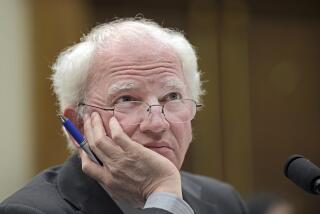Lawyer Denies Ethical Breach : Courts: Brief filed by Stephen Yagman says he committed no violation in strongly criticizing a judge. A disciplinary panel has urged his suspension for 15 months.
- Share via
Venice civil rights lawyer Stephen Yagman contends that he violated no canon of ethics and should not be sanctioned for his withering criticism of U.S. District Judge William D. Keller, whom he accused of being anti-Semitic, drunk on the bench, “ignorant, dishonest . . . a bully and one of the worst judges in the United States.”
Yagman took this position on his comments in a brief filed in Los Angeles federal court that became available Monday.
The controversial attorney was responding to a May ruling of a special panel of three Los Angeles federal judges, who said he “impugned the integrity of the court” when he made the accusations against their colleague Keller.
The judges also ruled that Yagman engaged in judge shopping. They said he criticized Keller in an effort to force Keller to remove himself from trying Yagman’s cases, most of which allege use of excessive force by police officers. Keller, a former U.S. attorney and a 1984 appointee of President Ronald Reagan, is generally viewed as sympathetic to law enforcement.
The ruling by the three-judge panel--John G. Davies, Edward Rafeedie and David W. Williams--was in response to action of a special disciplinary committee of the Los Angeles federal court, which filed charges against Yagman in late 1992 after Keller lodged a complaint. Earlier this month, the committee recommended that Yagman be suspended from practicing in federal court in the Central District of California--a seven-county area stretching from Riverside to San Luis Obispo--for 15 months.
In his brief, Yagman responded that the charges against him are “based entirely on speech involving criticism of a judge, which could have no effects on rights in litigation, and (on) private comments” he made to a judicial publication.
Expression in those forums is “important to public awareness, judgment and confidence in the judiciary in a free society . . . and should be protected from the chilling effect of punishment for its exercise,” said the brief, written by Yagman’s attorney, Ramsey Clark of New York, a former U.S. attorney general.
In their May ruling, the three judges cited as evidence statements Yagman made to a reporter from the Los Angeles Daily Journal, a legal trade paper; a letter he wrote to Prentice Hall, the publisher of a book of judicial profiles; an advertisement Yagman placed in the Daily Journal seeking information from lawyers whom Keller had sanctioned, and testimony of Robert K. Steinberg, a West Los Angeles attorney. Steinberg said Yagman told him he had criticized Keller in an attempt to force Keller off his cases, a charge Yagman denies.
The judges ruled that there is no evidence Keller is anti-Semitic or that Yagman “had a reasonable basis for making such accusations.” They also ruled that Yagman “has made no efforts to explain his accusations that Judge Keller is dishonest or ‘drunk on the bench.’ ”
In response, Yagman’s attorneys contend he “did not make false or defamatory statements and there is no basis in the record for a finding to the contrary.” The brief contends that judge-shopping was “alleged but not proven.”
The current controversy started when Yagman sought to have another federal judge, Manuel L. Real, recused--taken off--a case Yagman had filed against an insurance company. Keller rejected Yagman’s recusal motion in a decision in which he accused the attorney of “deceit,” “bad faith” and “actual intent to mislead the court.”
USC law professor Erwin Chemerinsky, who specializes in constitutional law and legal ethics, agreed with the two major contentions in Yagman’s brief on the recusal and 1st Amendment issues.
“In the United States, criticizing government institutions, even harshly, is protected by the 1st Amendment,” Chemerinsky said. “There is no crime of seditious libel in this country. People can’t be punished civilly or criminally for criticizing the government, and this brief rightly makes that point.”
In its original decision, the three-judge panel said a court could impose greater restrictions on a lawyer’s speech than it could on other citizens since they are “officers of the court.” That conclusion, among others, is expected to be the subject of an appeal by Yagman after the panel makes a decision on what sanction--if any--it will impose on him.
More to Read
Sign up for Essential California
The most important California stories and recommendations in your inbox every morning.
You may occasionally receive promotional content from the Los Angeles Times.













